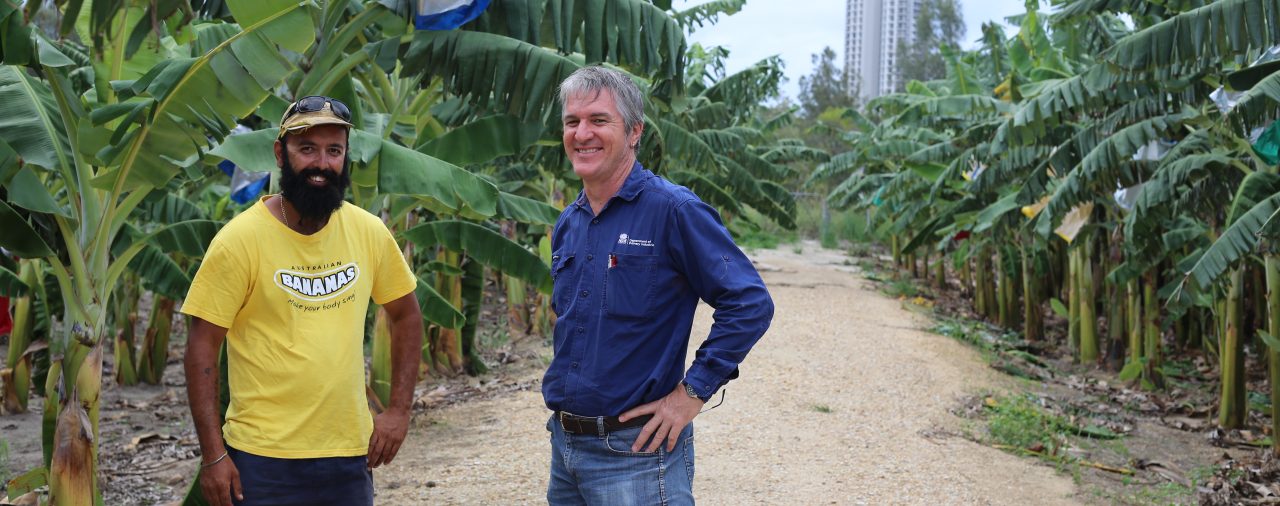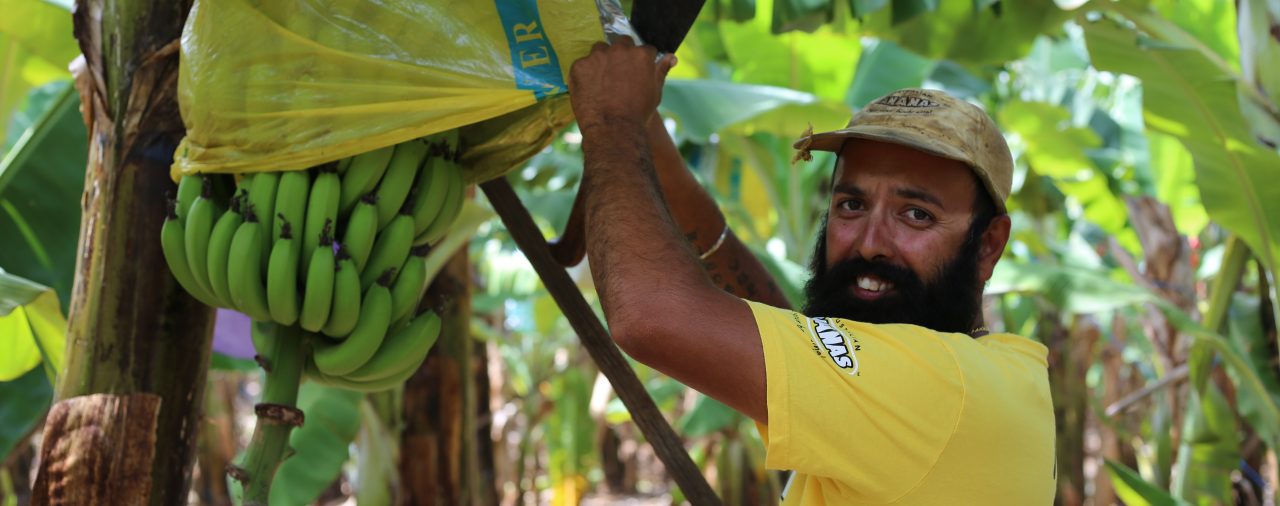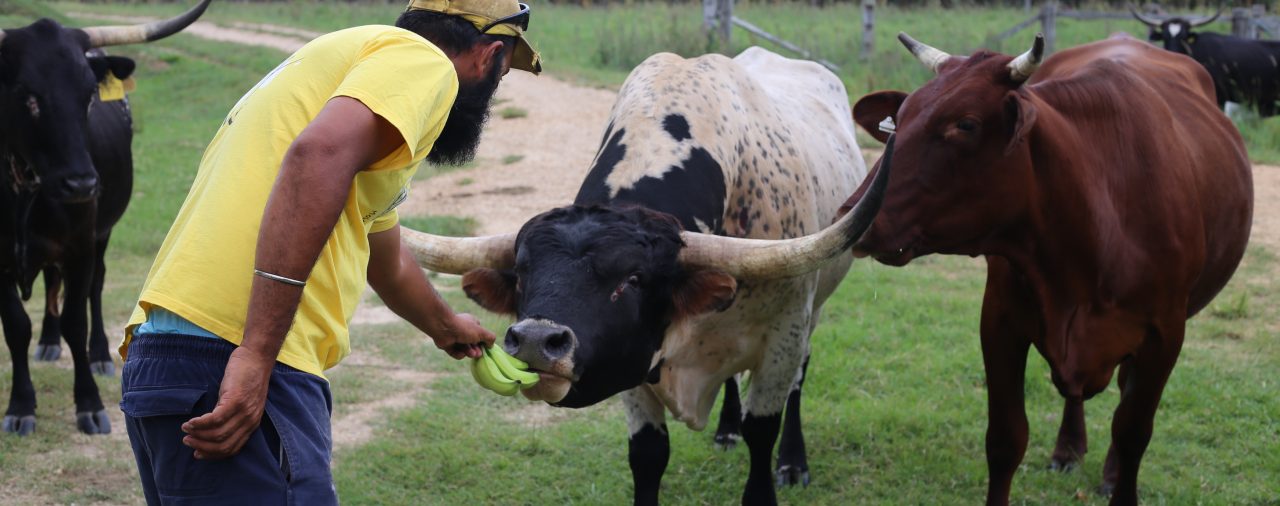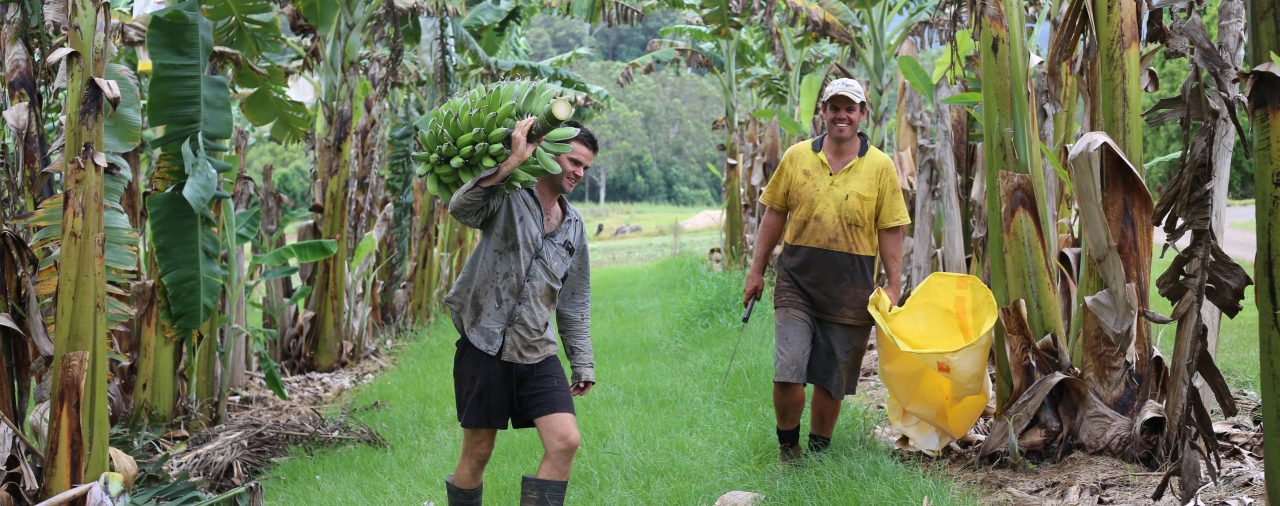By Amy Spear
With high-rise visible above the banana leaves and longhorn cattle grazing nearby, Colin Singh admits he’s got banana sap in his veins.
The unusual, almost suburban patch of bananas is one of two he currently manages in far northern New South Wales.
A fourth generation grower, Colin is the president of the Tweed Brunswick Banana Growers Association and one of a number of young growers setting out to make their mark on the industry.
“It’s a hard game, a lot of people say you’re mad for doing it,” he said.
“When I was younger, Dad wouldn’t let me into the bananas. Now that I’m old enough I can see why—he was probably hoping I’d become a doctor or something.
“It is tough, but while the bills are getting paid, you keep on doing it. There might not be brand new cars anytime soon, but you do enjoy it.”
Colin predominately grows lady fingers and some plantains, but is open to trying just about anything.
And, like others in the region, he knows they’ve got some work to do to stake their claim in a Queensland-dominated industry.
“I think there are people chasing NSW fruit but, talking to agents further south, we need to look at things like changing our boxes to a sturdier design. To get our name back in the market, we’ve really got to do what the buyer and the customer want.”
It’s a thought that’s echoed at the BGA meeting later that evening where, despite tough market conditions, growers are keen to make a name for their region.
After all, increasing reputation and boosting demand can only have a positive impact on the bottom line.
“Everyone wants an extra dollar if they can get it,” said Colin.
“The only way that happens is by working together. If we make changes, everyone has to be on board.
“We need to get together and listen to what the agents want rather than say ‘well, that’s how our fathers did it, so that’s how we should do it.’”
At the meeting, growers flag the idea of creating a joint brand and setting standards for packing. At a time when it’s hard to get people to join committees for just about anything, the level of enthusiasm at the Murwillumbah Golf Club is exciting.
In nearby Chillingham, brothers Matt and Daniel Thomson farm 20 acres of lady fingers, alongside sweet potatoes.
Like Colin, they’re fourth generation growers who have been growing for about three years.
“We got back into it because of the spuds,” said Daniel.
“You can’t pick a spud when it’s wet, so we had to have two crops going.”
They acknowledge that there’s a lot of younger growers getting into the game.
“Years ago, back when our old man was growing, bananas used to be bigger than cane in the Tweed. Now, you just have to look at how much cane is around. But the next generation is trying to get bananas growing again.”
Their location presents its own challenges— namely, the cold.
“We’ve got to nurse sucker and make sure all our fruit is cut before June, otherwise it turns grey,” explained Daniel.
“You’ve only got your fruit for four or five months of the year, but it works alright with the spuds, because we can do them in winter.”
But there are other factors—aside from weather and the hard, physical work—that make it tough for the younger growers starting out.
“One of the biggest problems in this area is finding land,” said Matt.
“Land is so dear around here—there’s a lot of good properties around but landowners don’t want to lease it. It’s hard to get a start.”
On top of searching for clean, panama-free ground, the brothers estimate you’re looking at $1 million or more for good land with reliable water.
Then, of course, the biggest hurdle: poor prices for fruit.
“At the end of the day, you might have 2 or 3 years when you don’t make any money. You’ve got to be in it to win it.”
At least, in the Tweed area, there’s a sense young growers aren’t in it alone.
Even as some maintain second jobs until their bananas take off, it’s clear there’s a feeling of community within the local industry.
“Though everyone is spread out, people still know each other and are happy to help out,” said Colin Singh.
“Hopefully we can work together, even with the growers further south in Coffs Harbour… we’re always swapping ideas and asking each other questions.”
While Colin has his own contacts, he attributes many of the valuable connections he has made to Industry Development Officer Matt Weinert.
They’re connections that are likely to grow as part of Mr Wienert’s new project, which includes establishing a NextGen style group for mid to north New South Wales.
“Give us time,” said Colin. “In another couple of years I reckon we’ll get our name back in the market, and our quality back up there.”





